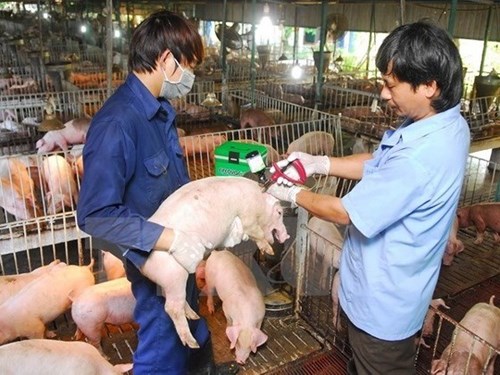Accordingly, all forms of transporting, trading, slaughtering and consuming imported pork products without clear origin are prohibited.
The PM asked Chairpersons of the People’s Committees of centrally-run cities and provinces to instruct people’s committees at lower levels, relevant departments and agencies to closely supervise at border gates, trails and border areas people and vehicles entering Vietnam from countries hit by the ASF.
    |
 |
|
The Vietnamese Ministry of Agriculture and Rural Development asked localities to monitor local pig farms and take samples for testing immediately if they notice any strange symptoms. (Photo: danviet.vn) |
The localities were urged to promptly detect and strictly punish any case of illegally transporting animals and their products from foreign countries.
ASF is a tuple of infectious hemorrhagic fever which has a 90-100 percent mortality rate for pigs and there is no vaccine or cure.
Although the disease is not dangerous to humans, it can cause great economic loss for farmers and harm pork trading.
From the end of 2017 to September 10, 17 countries and regions in Europe and Asia such as China and Estonia have had ASF outbreaks, with over 560,000 pigs culled, according to the World Organisation for Animal Health.
From the start of August to September 10, China reported 14 outbreaks, with 38,000 pigs culled. The disease is moving southward towards provinces near Vietnam.
ASF is spread from pig to pig through various ways, including animal feed contaminated with the pathogen, carriers such as ticks, or direct contact between infected pigs and healthy ones.
The incubation period is around four to 19 days, with symptoms including high fever, loss of appetite and hemorrhage. Sometimes, pigs can die even before clinical signs appear.
The structurally complicated ASF virus is very resilient and can persist in undercooked pork products or corpses, but they can be killed when exposed to 56 degrees Celsius for 70 minutes, or 60 degrees Celsius, or with traditional sterilization substances.
Dam Xuan Thanh, deputy head of the Department of Animal Health under the Ministry of Agriculture and Rural Development, said the disease is mostly transferred via human actions.
The virus does not spread as quickly as classical swine fever or foot-and-mouth disease viruses.
The trading of pork of unclear origin and transportation of untested pigs or port products (via smuggling or gifts) can carry the disease from one country to another, such as the case where a Korean airport detected the ASF virus in food brought from China, he added.
Nguyen Van Long, head of the Epidemiology Department of the Department of Animal Health, said at a conference on the disease held in HCM City on September 11 that the only way to detect the disease is through testing samples from pigs.
Authorities have been in instructed to strictly monitor pig farms for signs of infection, while pig farms can apply strict bio-safety regulations for farms, with frequent sterilization for farming equipment, barns and farmers, he said.
Source: VNA